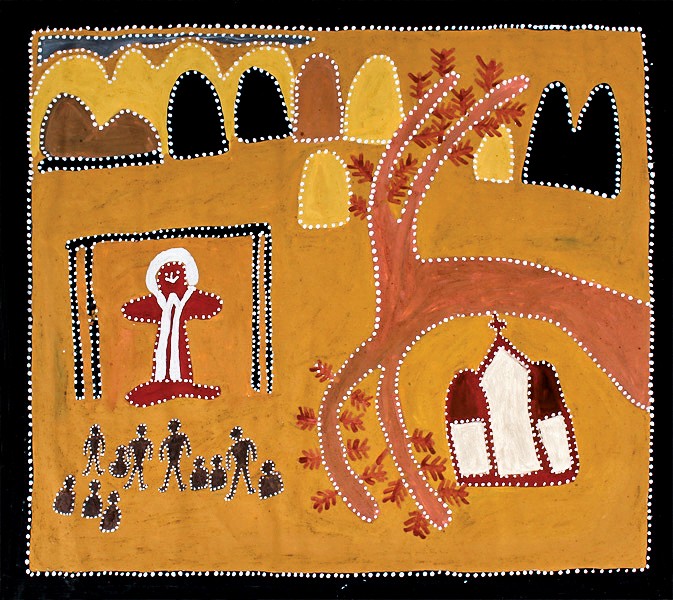Love thy NAIDOC week – celebrating Aboriginal culture

People talking to Jesus in the Brough shed, by the late Queenie McKenzie of Warmun was selected as the artwork for the Aboriginal and Torres Strait Islander Sunday 2019 Poster. Photo: Supplied.
By Eric Martin
Perth Auxiliary Bishop Don Sproxton has this week called for churches to embrace the message of the 2019 Aboriginal and Torres Strait Islander Sunday.
Held on the first weekend of July each year and coinciding with the National Aboriginal and Torres Strait Islander Day of Action (NAIDOC) Week activities, Aboriginal and Torres Strait Islander Sunday is a day for the Catholic community to acknowledge the stewardship of the traditional owners of this land.
This year’s theme of “Peace to the house and all who dwell within” is taken from Luke 10:1-12 and focusses on the necessity of taking time to nurture the inner peace that comes with faith, and how God’s peace can bring healing to the wider community.
“Over the last few years it has been wonderful to hear about many parishes celebrating Aboriginal and Torres Strait Islander Sunday for the first time,” Bishop Sproxton said.
“As an Archdiocese we have begun a Reconciliation Action Plan process as we learn how as a Catholic community we can walk alongside our Aboriginal and Torres Strait Islander brothers and sisters.
“This year I strongly encourage parishes to celebrate NAIDOC Week and Aboriginal Sunday and I look forward to seeing and hearing about how parishes across Perth celebrated Aboriginal and Torres Strait Islander Sunday in 2019.”
NAIDOC stands for the “National Aborigines and Islanders Day Observance Committee”, the original organisation responsible for implementing national activities during NAIDOC Week – though the committee is now defunct, its acronym is still used as the name of the week itself.
NAIDOC Week grew from humble beginnings in the 1920’s as a boycott of Australia Day celebrations by the indigenous community and on Australia Day, 1938, protestors marched through the streets of Sydney on what became known as “The Day of Mourning”.
It was one of the first major civil rights gatherings in the world, not just Australia.
From 1940 until 1955, the Day of Mourning was held annually on the Sunday before Australia Day and was known as Aborigines Day.
In 1955, Aborigines Day was shifted to the first Sunday in July after it was decided the day should become not simply a protest day, but also a celebration of Aboriginal life and culture.
A number of church groups, including the Australian Catholic Church, Aboriginal organisations and state and federal government all supported the formation of the National Aborigines Day Observance Committee (NADOC) and at the same time, the second Sunday in July became a day of remembrance for Aboriginal people and their heritage.
With a growing awareness of the distinct cultural histories of Aboriginal and Torres Strait Islander peoples, NADOC was expanded to recognise Torres Strait Islander people and culture.
The committee then became known as the National Aborigines and Islanders Day Observance Committee (NAIDOC) – the acronym that is still synonymous with celebrations of indigenous culture.
